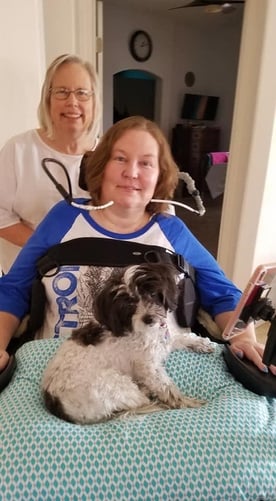Peer Spotlight: Erin Snyder - Reeve Foundation
Erin Snyder first learned about the Christopher & Dana Reeve Foundation’s Peer & Family Support Program (PFSP) when she arrived at Barrow NeuroSpine and Rehabilitation Center of Phoenix in 2016. After four months in the hospital, the 39-year-old was feeling overwhelmed with how she would manage a C4, C5 complete injury from a car accident.
“One day Kevin left me a packet of information and a thumb drive with all the things he is doing,” says Snyder of Kevin Olson, a Reeve Foundation peer mentor who also attended Barrow. “It was so helpful to get started when I didn’t know where to begin. It was like a security blanket to fall back on.”
Olson is one of more than 430 Reeve Foundation peer mentors in 40 states who have connected with more than 15,000 peers (individuals who are being mentoring) since the program began nine years ago. Typically, peers are matched on level of injury, gender, marital status, age and cause of paralysis. For Snyder, the connection was a lucky encounter.
“It was so nice to talk with someone going through the same thing. Kevin was able to answer a ton of questions you would never think of before you are paralyzed,” says Snyder of Olson who has the similar level of injury from a car accident more than 10 years ago. “He gave me ideas to try, like making kits for catheter care and purchasing a rotating bed designed for spinal cord injuries.”
Now Olson and Snyder talk every Monday on the phone, and they have met three times for lunch. Through the PFSP, peers determine the frequency of encounters, topics of discussion, and how they will communicate with their mentor (in person or by phone, email, text, or video chat). Whether the mentoring is a single encounter or a long-term connection, the relationship always remains private and confidential. To date, it is estimated that the program has led to more than 27,000 encounters (meetings or contact between a mentor and peer).
Peers can be newly injured individuals or those who have been living with paralysis for years as well as family members or caregivers. Peer mentors are living with paralysis or caring for someone living with paralysis for at least one year and are able to demonstrate skills and an outlook that empowers others.
“One of the best things Kevin did for me was encourage me to go out and do things, like start tutoring and go to concerts and sporting events,” says Snyder who was a high school math and science teacher for 15 years before her accident. “He gave me the confidence to try new things.”
Peers often find that having a peer mentor leads to reduced feelings of isolation and increased confidence and motivation. Peers also report feeling a strengthened sense of self-determination as well as an improvement in their outlook on life and independent living skills. But the relationships are also beneficial for the peer mentors.
“Since I am a bit younger, I was able to share some helpful technology resources with Kevin to help him be more independent,” says Snyder. “I told him about smart light switches connected through Amazon’s Alexa and WEMO products that enable users to control home electronics remotely.”
Now Snyder looks forward to sharing these resources and her experience with others as a Reeve Foundation peer mentor herself.
“Kevin suggested I become a peer mentor, but I didn’t think I was ready,” says Snyder. “I decided to do the training after one of my former high school students sustained a spinal cord injury, and I wanted to help him. It was time to start giving back what I know.”
Last year, Snyder completed the virtual peer mentor training which includes group discussions about effective peer mentoring, ethics in mentoring, and interpersonal communication skills. There is also a continuing education program for certified mentors.
“Everyone has something to share with others,” says Snyder. “You never know how much a person needs support, and you might be that one bright spot. Helping others can be an important part of the recovery cycle.”
Snyder continues, “Having a mentor is a great outlet. Pride may make someone afraid to open up or admit that they need support, but it helps to share what you are going through. A peer mentor can understand what no one else will.”
For more information on the Peer & Family Support Program and to request a mentor, please go to https://www.christopherreeve.org/get-support/get-a-peer-mentor.
Join Our Movement
What started as an idea has become a national movement. With your support, we can influence policy and inspire lasting change.
Become an Advocate